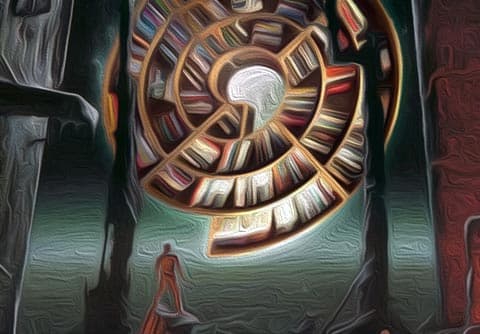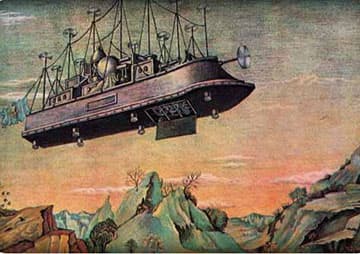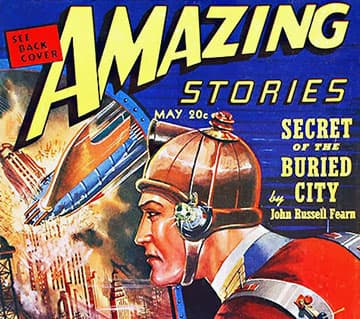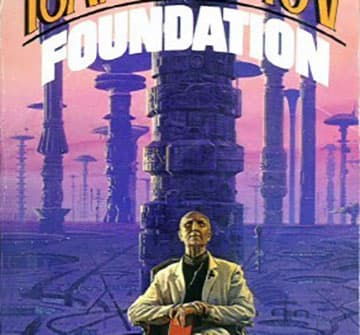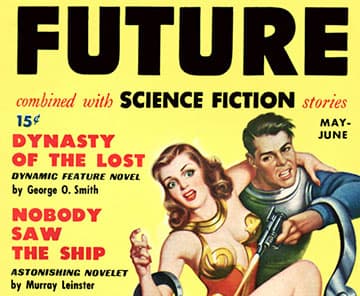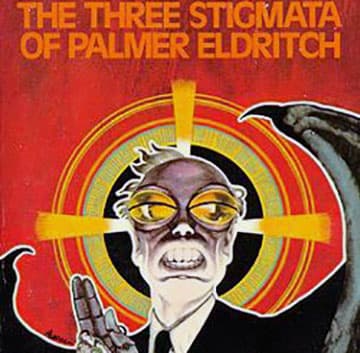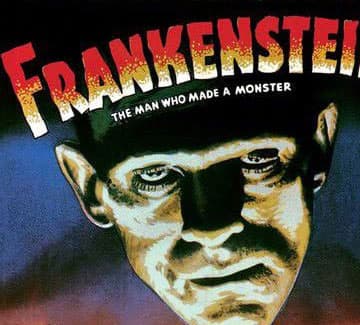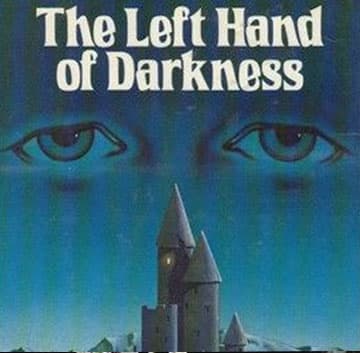What is science fiction?
Hard definitions • Fuzzy definitions • The SF family • Border disputes • More fabulous anomalies • New words for an old world
Latest revision: September 19, 2025
Among the works on the Greatest Literature of All Time list are several dozen that may be counted as science fiction (also known as sci-fi, speculative fiction or SF).
But the separate Greatest Science Fiction list consists of much more than these titles. More than a couple hundred works actually.
Where did all those extra titles come from? Like the larger literary list, the science fiction list is an amalgam of the assessments of many, many readers, writers and critics. I've read a lot of the works on the list myself, but I've consulted countless other references to see how others have assessed the field.
For the overall approach to selecting works, you can consult the article "Creating the Greatest Literature of All Time list" and "What does 'greatest' even mean?"
But putting together a science fiction list requires facing a specific challenge. Namely, the question of defining science fiction.
So what is SF anyway?
Hard definitions
Defining anything—especially anything embedded in our cultural practice—is difficult.
Philosopher Ludwig Wittgenstein didn't like hard and fast definitions. He preferred to talk of family resemblances. When we use so-called definitions to group things, we are really using rough similarities that appeal to us in various contexts.
Here's how it works with trying to define "science fiction". Let's start with some historical attempts:
• Jules Verne, often considered the father of science fiction, never used the term, though roman de la science (scientific romance), which he used to describe his innovative tales of flying contraptions, submersible vehicles, and cannons to the moon comes close. Despite his works being scientifically credible, he claimed not to predict future developments in his nineteenth-century fiction.
• British essayist William Wilson is credited with coining the phrase "science fiction" in 1851. He defined it as fiction
in which the revealed truths of Science may be given, interwoven with a pleasing story which may itself be poetical and true—thus circulating the knowledge of the Poetry of Science, clothed in a garb of the Poetry of Life.
That's so pretty, we wish it were still true. But much of what we call science fiction today does not reveal "truths of Science". And many a pleasing story could be written to reveal such truths without being called science fiction.
• Nonetheless, this view of science fiction as edifying literature caught on after American pulp-magazine editor Hugo Gernsback revived the term in 1929. He discarded his own term, "scientifiction", as being too awkward and he promoted science fiction as
a factor in making the world a better place to live in, through educating the public to the possibilities of science and the influence of science on life.... Science fiction would make people happier, give them a broader understanding of the world, make them more tolerant.
A noble dream, which still persists as a strain in SF.
But many stories of what we call science fiction are pessimistic about science or about the future of humankind, and some can be downright intolerant. Wilson's and Gernsback's "definitions" appear to be prescriptions for what science fiction could be, rather than descriptions of what it was—or is.
• The harder-nosed John W. Campbell, prominent editor and writer during science fiction's "Golden Age" of the late 1930s to early 1950s, saw science fiction as running parallel to science fact:
Scientific methodology involves the proposition that a well-constructed theory will not only explain away known phenomena, but will also predict new and still undiscovered phenomena. Science fiction tries to do much the same—and writes up, in story form, what the results look like when applied not only to machines, but to human society as well.
This may be considered the definition of what became known as "hard science fiction", especially in the United States. (Incidentally, Campbell's own early stories were really more about invention, with his youthful characters constantly creating new earth-shaking and space-shattering devices, giving rise to the thought that maybe it should have been called "tech fiction".)
• A Campbell's protégé, Isaac Asimov, who became one of the leading science fiction writers in the world, softened the definition while keeping its basis in science:
Science fiction is that branch of literature that deals with human responses to changes in the level of science and technology.
This seemed a handier definition, though developments in the SF field during the second half of the twentieth century would force a rethinking.
Fuzzy definitions
Much science fiction still adheres to the "hard science" methodology. But we've had an equal load of creative, artistic and even fanciful science fiction that does not. British and European work have especially deviated wildly from the hard-science prescription, and even much American SF since the 1960s would be unrecognizable as such to Campbell.
• Following Asimov, other definitions have retained a modified connection with science: science fiction is seen as the literature responding to an increasingly scientific and technological society—dealing with our hopes and fears in this kind of world. American writer Reginald Bretnor (Russian-born like Asimov) referred to fiction
in which the author...takes into effect in his stories the effect and possible future effects on human beings of scientific methods and scientific fact.
Problem with this: a lot of modern literature does this without being known as science fiction. And a lot of what we do call science fiction uses science or technology—space ships, time machines, drugs, etc.—essentially as plot devices without having much to say about how these toys are affecting our psyches or societies.
• Science fiction is about the future then? Especially a technologically advanced future? This is the description of the field you often hear: science fiction as prophecy. Science fiction great Robert Heinlein, known for his "future histories", said a short definition of "almost all science fiction" might be:
realistic speculation about possible future events, based on adequate knowledge of the real world, past and present, and on a thorough understanding of the scientific method.
However, many science fiction plots take place in the past or present, or in parts of the universe with no time relation to ourselves. The proportion of science fiction that seriously purports to predict our future or to warn us against a possible future is actually quite limited.
• No wonder Heinlein added: "To make the definition cover all science fiction (instead of 'almost all') it is necessary only to strike out the word 'future'." Science fiction and fantasy writer Barry N. Malzberg came up with a summarizing definition of science fiction as
That branch of fiction that deals with the possible effects of an altered technology or social system on mankind in an imagined future, an altered present, or an alternative past.
• So maybe it's not just about future times but about other situations in space and time, in other dimensions, in other realities. The term "speculative fiction" became popular as an alternative to "science fiction", retaining the SF acronym. American-Canadian writer Judith Merril defined speculative fiction as
stories whose objective is to explore, to discover, to learn, by means of projection, extrapolation, analogue, hypothesis-and-paper-experimentation, something about the nature of the universe, of man, of "reality" .
But we'rer back to our old problem here: if we make our definition broad enough to include all SF, it comes to encompass almost all literature, not just science fiction. It's hard to think of any novel of any kind that does not involve something imagined by the author and helping explain something about their world. The definition is too inclusive.
Isaac Asimov had such an objection to this phrase:
...almost anything can be speculative fiction. A historical romance can be speculative; a true-crime story can be speculative. "Speculative fiction" is not a precise description of our field and I don't think it will work. In fact, I think "speculative fiction" has been introduced only to get rid of "science" but to keep "s.f."
The SF family
• A most sophisticated, insightful and difficult definition of science fiction comes from Yugoslavian-Canadian poet and professor Darko Suvin, who has written at least three books trying to pin down the field. At one point he declares:
SF is distinguished by the narrative dominance or hegemony of a fictional "novum" (novelty, innovation) validated by cognitive logic.
Suvin is putting forward a variation on the what-if definition. In every SF story there is one modification to current reality ("novum") on which the story hinges. Most importantly, it is followed through with logical consistency—to become part of our store of knowledge about things.
This definition is more practical than most because having an innovation to current reality at the centre of the story separates SF from general literature while, at the other end of the SF spectrum, cognitive validation separates it from wildly fantastic stories.
However, now we have the problem of being too exclusive. Strictly applied, this definition would exclude some of the more imaginative literature that the world considers science fiction. Some writers—the names Brian Aldiss, Harlan Ellison, J.G. Ballard, and Philip K. Dick come to mind—seem not to care whether their plots hold together cognitively, as long as they work viscerally. That is, they want readers to go with the flow, however credible the scientific or logical underpinnings are.
• And now for the winner. We could go on and on with definitions of SF and their failings, but it's time to settle for the final infallible definition [drum roll]:
Science fiction is whatever we call science fiction.
[Disappointed groans.]
Others have put it differently: "anything published as science fiction" (Normal Spinrad) or "a label applied to a publishing category...subject to the whims of editors and publishers" (John Clute and Peter Nicholls).
But stop groaning. This is not as tautological or downright wimpy as it may at first seem. It's an acceptance of the family resemblances approach mentioned earlier. It's saying we amorphously group together literature that has bits of all the above definitions into one family, but members of the family don't necessarily meet all the criteria, and a few individuals that do meet one or two of the criteria still aren't considered members.
So a typical piece of SF literature may or may not take place in the future or in an imagined past or an alternative present. It may or may not feature scientific innovation or technological advance, and possibly an exploration of the effects of these changes on people or on their societies. Spaceships, time travel, mind control, virtual reality, robots, aliens, predictions of the future, dystopias—these are all among the dozens of elements that may or may not be part of the story.
But any combination of these characteristics of a given piece of writing could make us think, "Oh, yeah. That's science fiction."
Despite holding this fuzziest of fuzzy definitions of science fiction, when we look for a book in a store, we usually have a pretty good idea whether we should be looking in the Science Fiction section or elsewhere. Usually most of us would agree on where to look. Mostly.
True, several genre-busting books are hard to place, because they could fall into several categories. Lord of the Rings? Nineteen Eighty-Four? Utopia? Dracula? The Handmaid's Tale?
Over time, the borders of the categories may shift. We'll get to these border issues shortly.
But for now, let's just note that for most books at any given time, we can walk directly to the appropriate section. We have an idea of what science fiction is—derived from all the references to "science fiction" we've heard in our lives. We have a sort of social consensus about how we use that term "science fiction" in everyday language.
That consensus, which I've learned to identify through my own life experience among language users, is what I use to determine what is science fiction for the Greatest Science Fiction list.
Of course, the consensus is not complete nor final. Never will be. So let's look at some of the more contentious anomalies, which paradoxically can help us clarify what we mean by "science fiction".
Border disputes
Several other literary genres are sometimes lumped in with science fiction, but are not included in the list of The Greatest Science Fiction. On the whole they are not included because most science fiction readers would not consider them science fiction—as far as I can tell from my own experience among language speakers using the words "science fiction" or analogous terms.
But here are a few rationales for their inclusion or exclusion:
• Horror: Mary Shelley's Frankenstein is often considered one of the first science fiction novels as well as a great work of horror, while Bram Stoker's Dracula is usually left in only the latter category. Why the difference? Possibly because in the novels Shelley's monster was created by science while Stoker's was supernaturally invoked. If we accepted Dracula as SF, then we might also have to accept every ghost story, Greek myth and fairy tale, not to mention many religious texts such as the Bible. Moreover, Frankenstein is often seen as a response to technological advances and a warning about scientific pride, while Dracula is not.
However, it may be noted Europeans are more likely than North Americans to count Dracula and other horror tales among sci-fi's progenitors, sometimes citing the supposedly psychological science exploited in that novel.
Robert Louis Stevenson's Strange Case of Dr Jekyll and Mr Hyde may be seen as situated halfway between Frankenstein and Dracula on the science fiction-horror spectrum. In that story scientific means are adduced for the creation of a monster but those means are somewhat irrelevant to the point of the story. The cause of Doctor Jekyll's transformation could have been a magical spell and the essential horror of the tale would remain. A similar point could be made concerning some of Edgar Allen Poe's works. But Jekyll and Hyde and at least one Poe story have appeared on our science fiction lists—to be as inclusive as possible, without being ridiculously so.
• Fantasy: This is a genre that's as difficult to define as science fiction. Some publications and book stores put them together as "science fiction and fantasy" (or in the opposite order). The fact that both names are used, however, is a hint they are not identical, although the dividing line is somewhat blurred.
The difference is sometimes spelled out alike this: science fiction looks at possibilities based on our known natural laws, while fantasy looks at possibilities that break our known natural laws. So machines flying to the moon are science fiction, while dragons flying on earth are fantasy. Advanced technology is SF, while magic spells are fantastic.
You might ask: how about stories that have spaceships flying faster than the speed of light or other devices that break known natural laws? Aren't they science fiction?
Two answers: 1) They may be bad science fiction. 2) The authors are supposing the discovery of scientific means to circumvent limitations such as the speed of light, which is different from having a wizard mutter a few incantations to whisk people across the universe, which would be the supernatural fantasy approach.
On this same borderline may be the Dragonflight books of Anne McCaffrey, in which the beasts fly and other psychic phenomena occur, but are given scientific underpinnings, however flimsy. Somehow though, the consensus seems to be that her books feel more like fantasy than sci-fi.
And then there's the fantastic (in all senses) World of Tiers series by Philip José Farmer, which I never have been able to categorize. But it is a little closer to SF and so is included on the science fiction list, along with his more straightforwardly SF series, Riverworld.
More fabulous anomalies
• Fabulation and Slipstream: Fabulation is a latter twentieth-century trend in literature in which some elements of the story are clearly fantastic while others are natural. Some critics would put fabulists like Jorge Luis Borges and Thomas Pynchon, and a whole host of Latin American magic realists, in the SF category. For the most part, however, this has been considered a separate genre of fiction or a part of the mainstream literary tradition.
Related is the slipstream, as fans have taken to calling stories that involve some science fiction elements but aren't really about those elements, focusing more on traditional literary issues. It's often considered a derogatory term, implying mainstream writers are just throwing in some sci-fi bits to spice up their stories.
However, many accepted science fiction works, such as by Philip K. Dick and Kurt Vonnegut, might also be considered slipstream by a strict definition. Their stories can include science fiction devices such as space flight, time travel or alternative social structures, yet they may concentrate entirely on questions of morality or relationships causally unrelated to those devices. It's a judgment call whether to include them in the science fiction category, though the tendency is to do so.
• Progenitors of SF: Claims have been made for stories going back to ancient literature—if not as science fiction, at least as forerunners of science fiction. Thus mythology such as Gilgamesh and the Iliad are claimed as proto-science fiction. Mainly for their fantasy elements.
However, without any connection with science or technology, these just don't feel like science fiction, even in the genre's infancy. The earliest works on the Greatest Science Fiction list tend to involve using science or technology to either fly to the moon (a common dream once we became astronomically sophisticated) or build human-like creatures (a common dread, it seems, once we began to think of the human body as a machine). It seems to take a certain materialistic, post-mythological understanding of the world for the emergence of a literature we can call science fiction.
• Utopian and Dystopian Literature: This is a tough one. Extraordinary voyages make up a lot of what we call science fiction and often the voyages purport to discover other civilizations, typically depicted either as ideally organized to be emulated or as nightmares to be avoided. Often this is the author's point: he is taking us to another land to give himself an opportunity to pontificate upon the best or worst social systems we may adopt ourselves. Or he's using the comparison of the imagined world with our current society to highlight aspects of our own we wouldn't have otherwise noticed.
Generally, the more politically or philosophically inclined of these works, like Thomas More's Utopia and Samuel Butler's Erewhon, are not considered science fiction. Others in which the science or technology are more central seem to fall more comfortably into the science fiction camp.
This does not mean however that science fiction cannot be politically or philosophically interesting. Works such as Ursula Le Guin's The Left Hand of Darkness and The Dispossessed are both of those, and are considered solidly SF.
At some point in the early twentieth century, fictional utopias and dystopias stopped being discovered elsewhere on Earth during our own time and moved into future or futuristic settings. It's been suggested that this is when fantastic voyages became science fiction. Indeed the two most famous utopian/dystopian novels around that time—Aldous Huxley's Brave New World and George Orwell's Nineteen Eighty-Four—have futuristic elements and are included on the science fiction list. A more recent example is Margaret Atwood's The Handmaid's Tale.
New words for an old world
In trying to settle these boundary disputes, one cannot always be a hundred percent certain why particular works are considered to fall on either side of the line. The boundary is blurry and the decisions are inconsistent. The Greatest Science Fiction list tries to follow the consensus of language users, however erratic that may be.
But even the consensus is unclear at times. It could be said that here, as in other social affairs, we are always seeking a consensus as to what the consensus is.
That may be as definitive as we can get.
Let's leave the topic with one more philosophical quote, this from Ludwig Feuerbach:
We people the other planets, not that we may place there different beings from ourselves, but more beings of our own or of a similar nature.
This was written in 1841, before the term "science fiction" was known, and Feuerbach's subject was not literature but religion. But the insight stands today in regard to SF. Whatever our definition, science fiction is, like all art, always about us here and now.
You see, science fiction is not really so different from any other fiction in its essentials. What it says to us is not so different.
We just take it in differently.
— Eric

